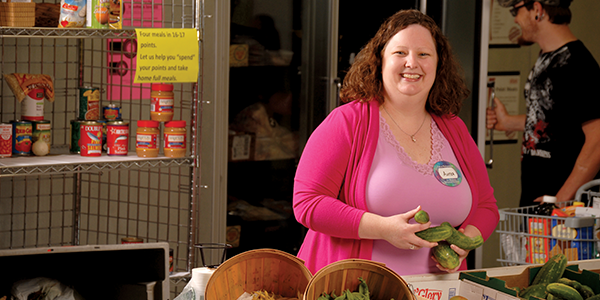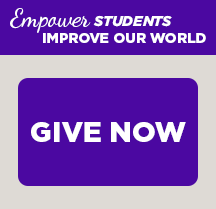Winona State University Sociology Professor, Aurea Osgood, doesn’t just teach community involvement, she lives it.
By Abby Peschges ‘13
“Hunger is something we can actually fix,” said Aurea Osgood. “It’s going to take a whole lot, and local food shelves aren’t going to fix it alone. I want to be part of the solution.”
Osgood began volunteering with the Winona Volunteer Service (WVS) Supplemental Food Shelf three years ago and is passionate about food insecurity. She also has a place at the Board of Directors’ table, giving voice to WSU within the WVS programs.
WVS is a non-profit service provider and advocate working to improve the quality of life in our community. Ditto for WSU. With a caring network of dedicated volunteers and partners, WVS secures and distributes food, clothing, information, referrals and emergency assistance in a respectful and dignified manner to people in need.
Not only is Osgood deeply involved with the organization, but so, too, are her sociology students. She has written right into her curriculum hands-on involvement with WVS. Last semester her students conducted needs assessment research to recognize Food Shelf patron needs and requests, and offer ways to improve the customer experience on both sides of the equation.
The Food Shelf is Winona’s only community food bank, and it relies heavily on the generosity of the entire Winona community, in the way of food and clothing donations, volunteer hours and cash.
WVS Executive Director Sandra Burke emphasized the importance of the partnership built with WSU and so many area businesses. These businesses and institutions don’t just contribute financially, but also in
the form of employee hours so staff can participate in Home Delivered Meals and Board involvement.
This fall, Osgood’s students are taking their research to the next level. Customer focus groups will help identify issues and/or hurdles patrons experience when using the Food Shelf, such as transportation to and from the Food Shelf, staple needs and food storage. These groups will identify ways to improve the shopping experience and assist the patron with selections.
“Numbers will tell you one thing, but stories will tell you another.” Osgood said. Osgood and Burke hope the focus groups will offer a more in-depth look at the overall needs of the community. The results could bring about changes in educational class offerings and product selection.
WVS has had many students volunteer their time before, but nothing quite like Osgood and her team. Osgood’s program allows for follow-up, which is critically important. The students gain experience by seeing a project through from start to finish.
Like Osgood, various WSU professors require students to clock community volunteer hours. Said Osgood, “Actually practicing a lesson in a real-life situation is where students learn. They are seeing the benefit, the impact it has in helping their community.”
Osgood and Burke hope to help the students create a lifestyle of “being involved and giving back” to the community in which they live. Osgood concluded, “Hopefully the students will think back to when they were in college and volunteer or find a way to contribute. We all need assistance at one time or another, and we can all help each other.”


